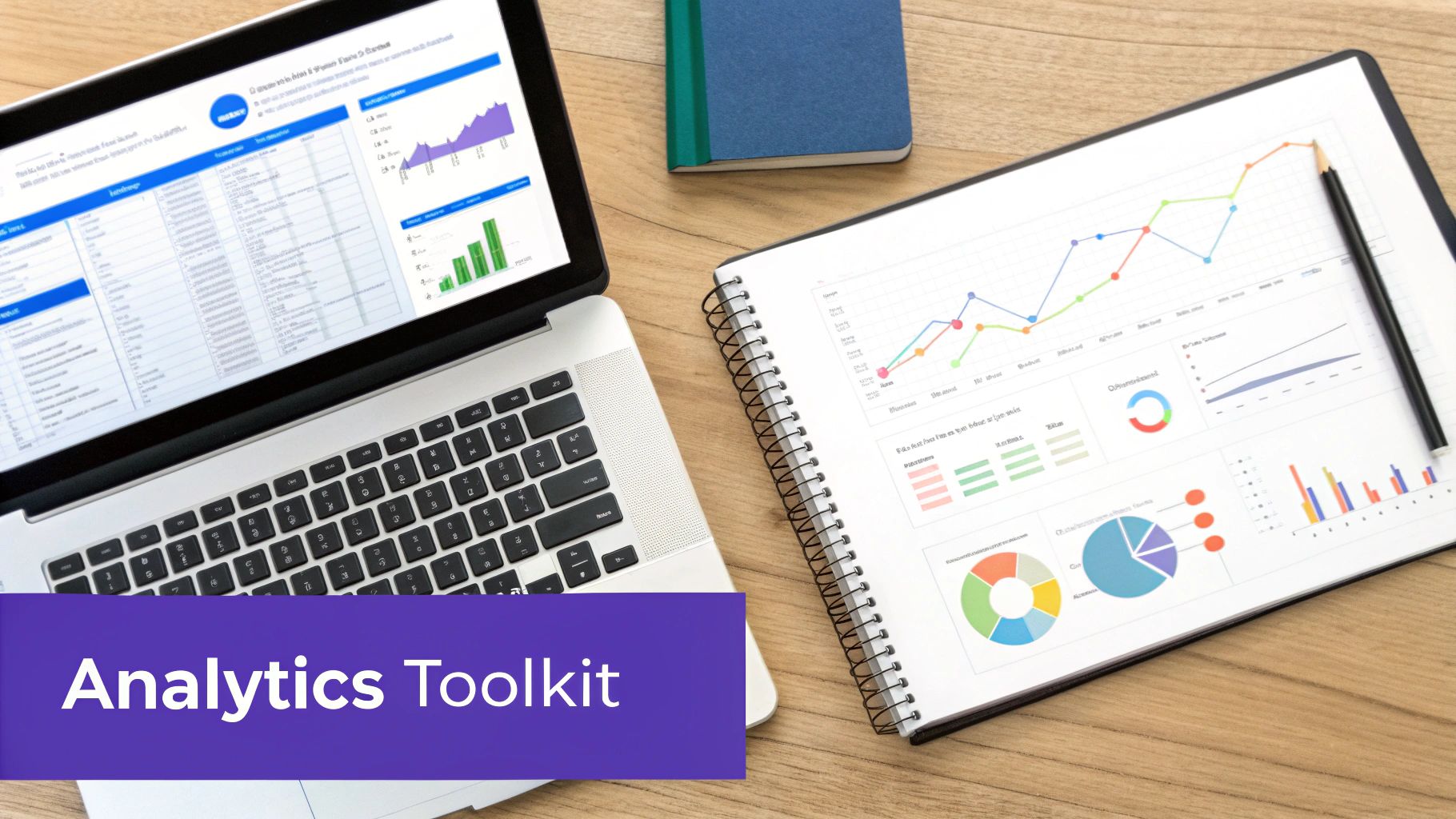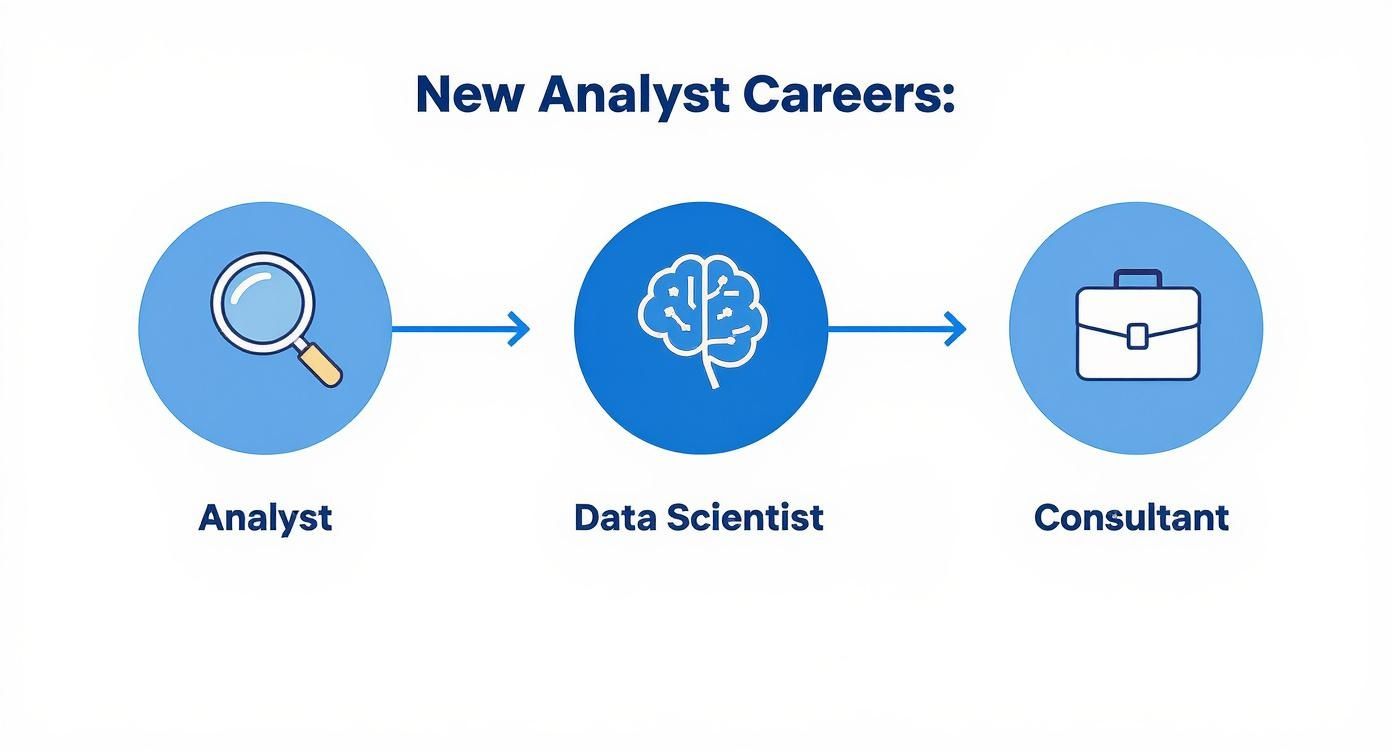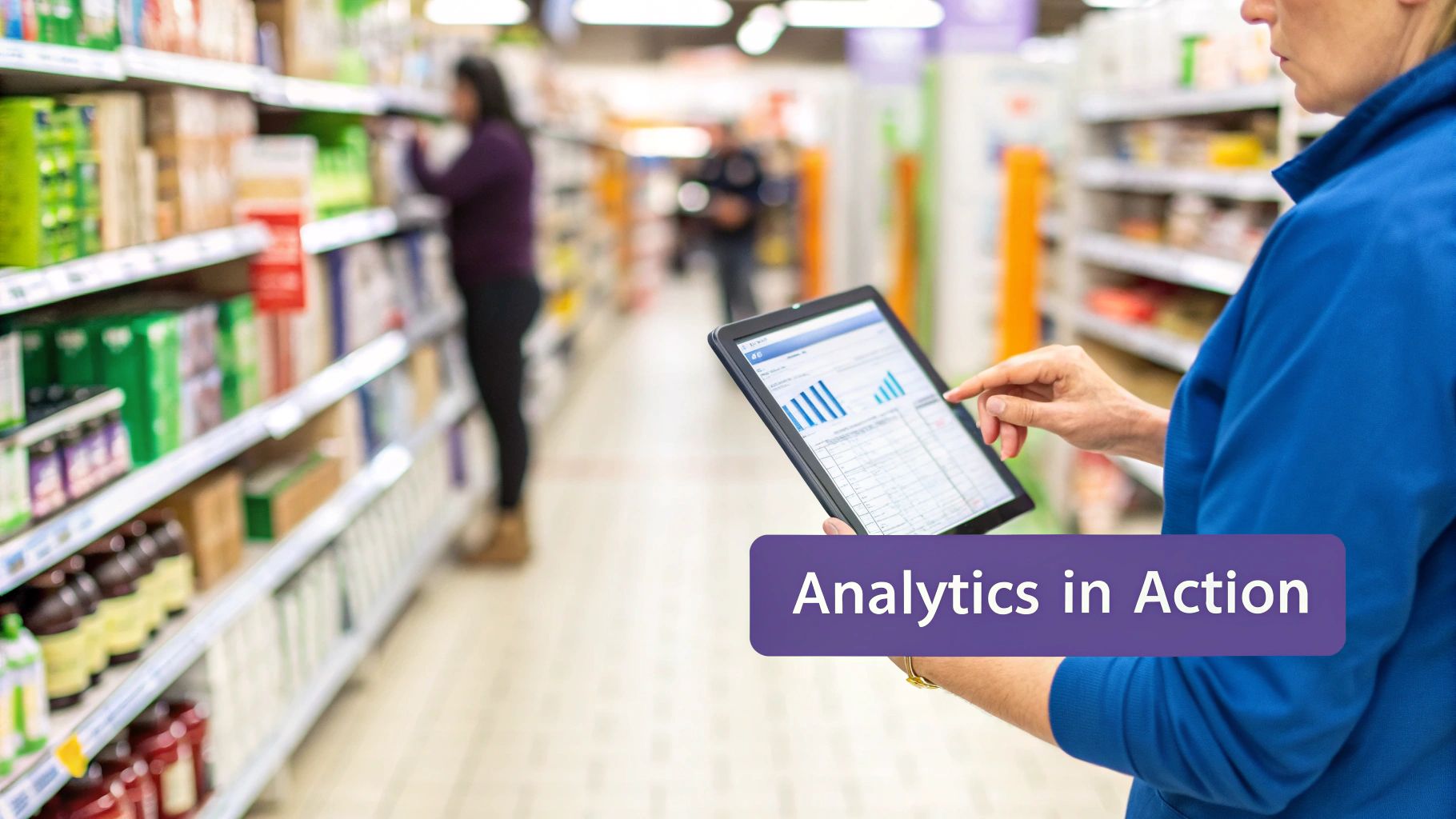Training in business analytics for Career Growth
Training in business analytics for Career Growth
Think of business analytics training as the process of learning how to turn a mountain of raw data into a story that actually means something for your business. It’s all about giving professionals the skills to look back at past performance, make educated guesses about the future, and suggest smart moves to make next. Essentially, it turns numbers into a clear narrative that helps everyone make better decisions.
What Is Business Analytics Training

Picture a business analyst as a kind of modern-day detective. They're constantly sifting through clues (data), spotting hidden patterns, and cracking the company's biggest cases (its business challenges). Business analytics training is the forensics class that teaches them this investigative mindset, giving them the tools and techniques to build a rock-solid case for any strategic decision.
This isn't just about getting good with a specific piece of software; it's a way of thinking that centres on asking the right questions. It trains you to glance at a spreadsheet packed with figures and see a story unfolding about customer habits, operational bottlenecks, or untapped market opportunities.
The Core Pillars of Analytics Training
Any solid training programme is built around three distinct areas of analysis. Each one builds on the last, creating a seriously powerful skillset that any organisation would be lucky to have.
- Descriptive Analytics (What happened?): This is the starting point. It’s all about summarising historical data to get a clear picture of what’s gone on. It answers questions like, "What were our total sales in the UK last quarter?"
- Predictive Analytics (What will happen?): This is where you start looking into the crystal ball. Using statistical models and forecasting, this stage tries to predict the future. It helps you tackle questions like, "Which of our customers are most likely to leave us next month?"
- Prescriptive Analytics (What should we do?): The most advanced stage, this is where the training really pays off. It doesn't just predict a problem; it recommends concrete actions to get the results you want. It answers, "What's the best marketing campaign to keep those high-risk customers on board?"
This step-by-step approach is becoming a cornerstone of higher education in the UK, with postgraduate training growing massively to keep up with industry demand. Plenty of programmes, like the MSc in Business Analytics at Queen's University Belfast, now mix business strategy with statistics and computing to get graduates ready for the real world.
Business analytics training gives people the power not just to report on data, but to interpret it, question it, and use it to guide an organisation towards smarter, evidence-based decisions. It’s the crucial link between raw information and meaningful action.
Ultimately, this kind of training is about developing a whole new way of thinking. It gives you a methodical framework for solving problems that is now hugely in-demand across every industry, from finance and retail to healthcare. Our UK guide to business analytics and intelligence dives even deeper into this topic.
Your Toolkit for Solving Business Problems

Think of effective training in business analytics as assembling a high-spec toolkit. Each new skill you learn isn't just another party trick; it's a specialised instrument designed to solve a specific, complex business problem.
It’s about mastering a whole collection of interconnected skills that, when brought together, make you a seriously valuable strategic thinker. You learn to put these pieces together one by one, building a powerful capability for untangling messy challenges.
It’s a bit like being a top-tier mechanic for a Formula 1 car. You can’t just know how to change the oil. You need diagnostic software, precision instruments, and a deep understanding of how every single part of the engine works together. That’s exactly what a quality analytics programme gives you.
Building Your Core Competencies
The entire foundation of your analytics toolkit rests on a few essential pillars. These are the non-negotiable skills that empower you to find the signal in the noise and guide business strategy with real confidence.
Without them, all that data is just a jumble of numbers. A comprehensive training course will systematically build your expertise in these key areas, turning raw data into actionable insight.
The table below breaks down the core skills you'll develop and how they translate directly into solving real-world business challenges.
Core Skills from Business Analytics Training
| Skill Category | Specific Competencies | Business Application Example |
|---|---|---|
| Statistical Analysis | Identifying trends, patterns, and significant relationships using mathematical principles. | A marketing team uses statistical tests to determine if a new ad campaign actually increased sales, or if it was just random chance. |
| Data Mining & Cleansing | Sifting through messy data to find valuable info, removing errors, and preparing it for investigation. | An e-commerce business cleans its customer database to remove duplicate entries and fix typos before launching a personalised email campaign. |
| Predictive Modelling | Creating models using historical data to forecast future outcomes, manage risk, and spot opportunities. | A logistics company builds a model to predict delivery delays based on weather patterns and traffic data, allowing them to proactively reroute drivers. |
| Data Visualisation & Storytelling | Turning complex findings into clear, compelling charts, graphs, and narratives for decision-makers. | An analyst presents a simple, interactive dashboard to the board, clearly showing which product lines are underperforming and why. |
These skills rarely work in isolation. A retail giant, for instance, might use predictive modelling to forecast Christmas demand. That model is only reliable because it’s built on clean data (data mining) and tested with statistical analysis. The final recommendations are then pitched to the leadership team using sharp, clear data visualisations.
Mastering the Technical Instruments
Alongside these core concepts, you absolutely need hands-on experience with industry-standard software and programming languages. These are the power tools in your kit, the things that let you carry out complex analyses efficiently and at scale.
A skilled analyst combines a deep understanding of business context with the technical fluency to manipulate data effectively. One without the other is incomplete; together, they create a powerful force for organisational change.
The most common tools you’ll get to grips with include SQL for pulling data from databases, Tableau or Power BI for creating those all-important visualisations, and programming languages for more advanced modelling.
Of all the languages, Python has become the go-to choice for many, thanks to its versatility and huge ecosystem of data analysis libraries. For anyone just starting, figuring out how long it will take to learn Python is a great first step in planning your learning journey.
When you blend these technical instruments with a sharp analytical mindset, you create a cohesive and powerful skillset—one that lets you tackle almost any business challenge with data-driven precision.
Unlock New Career Opportunities
Completing a solid training course in business analytics does more than just tack another line onto your CV—it can be a launchpad for a whole new career path. It’s the difference between being the person who simply reports on data and becoming the one who interprets it, guiding strategy and creating genuine business value.
The demand for people who can turn complex data into clear, actionable insights has never been higher. This skill set opens doors to dynamic roles you might not have had access to before, placing you at the heart of an organisation's decision-making process. Forget generic job titles; this is about securing a position where you can make a real, tangible impact.
From Analyst to Influencer
With a good grounding in analytics, you can step into specialised roles that are now essential for any modern business. Each one gives you a unique chance to shape outcomes and drive growth.
- Marketing Analyst: You could be the person who uncovers the next big market trend for a high-street brand, using customer data to build campaigns that truly connect and convert.
- Operations Analyst: Picture yourself finding a multi-million-pound saving for a logistics company by modelling their supply chain data to root out hidden bottlenecks.
- Financial Analyst: You might develop the models that spot fraudulent transactions as they happen, protecting both the company and its customers from serious losses.
These aren't just back-office support roles; they're deeply strategic. Your analysis directly informs high-stakes business decisions, which gives you a powerful voice at the table and fast-tracks your professional growth.
Business analytics training is your ticket into a career where curiosity and evidence are your main tools. You become the storyteller who finds the narrative hidden in the numbers, steering the business towards a more profitable future.
Charting Your Career Path in the UK
The UK job market for skilled analysts is incredibly strong, with clear routes for advancement. As you build up experience, your career can naturally progress from an analyst role to more senior positions like Data Scientist, Analytics Manager, or even Chief Data Officer. This progression doesn't just come with more responsibility, but also a significant bump in your earning potential.
Employment data for UK graduates backs this up, especially for those who’ve completed specialised master’s programmes. Students from top-tier UK universities often land highly sought-after roles as AI & Analytics Consultants, Data Scientists, and Data Analysts with global leaders like Amazon, Barclays, and Deloitte. These strong industry links show how well-focused academic training aligns directly with what the marketplace is crying out for. To see how these programmes get graduates ready for top jobs, you can discover more about MSc courses at Warwick Business School.
How to Choose the Right Training Programme
Picking the right training in business analytics is probably the biggest decision you'll make on this journey. It's easy to feel a bit lost with all the options out there – everything from university master's degrees to online certificates and intense bootcamps. The trick is to look beyond the shiny marketing and zero in on what actually fits your career goals, your timeline, and your budget.
Think of it like choosing a vehicle for a road trip across the country. A zippy sports car sounds exciting, but it’s no good for hauling your gear. A campervan is comfortable but slow. It’s the same with training; a bootcamp might get you job-ready in a few weeks, but a master’s degree offers a much deeper theoretical foundation and a prestigious qualification. Your destination dictates the right vehicle.
This infographic lays out a simple decision tree to help you visualise some of the common career paths for new analysts.

As you can see, foundational analyst roles often serve as a springboard, naturally leading to more specialised positions like data scientist or strategic consultant down the line.
Evaluate the Curriculum and Tutors
The curriculum is the heart and soul of any programme. Don't just skim the module titles – dig in and see if it’s built around hands-on, practical work. A top-notch course will throw you into real-world projects, forcing you to get your hands dirty with industry-standard tools like Python, Tableau, and SQL.
A truly effective business analytics programme teaches you more than just software commands; it cultivates an investigative mindset. It should train you to ask challenging questions, test hypotheses, and present your findings with clarity and confidence.
You also need to check out who's doing the teaching. Are they academics who haven't been in the business world for years, or are they seasoned pros who have spent their careers solving the exact problems they're now teaching you about? The best programmes strike a balance, pairing solid academic theory with gritty, practical insights from people who’ve been in the trenches.
Consider Different Learning Formats
The UK has a massive range of learning formats, each designed for different people. Universities are constantly expanding what they offer to make analytics training more accessible. For instance, some institutions now provide interdisciplinary courses that mix data skills with management capabilities, which really speaks to the growing national focus on lifelong learning. Our UK Google Cloud Platform training guide also offers some great insights into training for specific platforms.
Here’s a quick comparison to help you weigh up the different training paths available.
Comparing Business Analytics Training Options
| Programme Type | Typical Duration | Best For | Key Outcome |
|---|---|---|---|
| University Master's Degree | 1-2 years | Those seeking deep, formal knowledge and a globally recognised qualification. | Comprehensive theoretical understanding and strong academic credentials. |
| Online Certification | 2-6 months | Self-motivated learners who need the flexibility to study around other commitments. | Specific, in-demand skills and a verifiable certificate from a reputable platform. |
| Intensive Bootcamp | 8-16 weeks | Career changers or individuals needing to get job-ready as quickly as possible. | Practical, project-based portfolio and immediate employability in a specific role. |
Ultimately, the right choice really boils down to what you're trying to achieve. There’s no single "best" option – only the one that aligns perfectly with your personal and professional ambitions. Choosing the right path means carefully matching the programme’s structure, cost, and end goals directly to your own.
Seeing Business Analytics in Action

Theory is one thing, but seeing how training in business analytics actually delivers in the real world is what really matters. All across the UK, businesses are using these skills to do more than just fine-tune their operations; they're completely rethinking how they work. These stories aren't just case studies—they're proof of analytics as a powerful tool for change.
Let’s look at a few examples of how different sectors have managed to turn their data from a jumble of numbers into a genuine strategic advantage. The results aren't just numbers on a spreadsheet; they translate into better services, bigger profits, and smarter decisions you can actually see and feel.
Optimising Retail with Predictive Analytics
A major UK supermarket chain was struggling with a huge, expensive problem: food waste. They were constantly getting the balance between stock and customer demand wrong. This meant good food was being thrown out every single day, hitting their profits hard and creating a massive environmental headache.
The answer was found in predictive analytics. By building models that looked at historical sales, seasonal patterns, weather forecasts, and even local events, the company started forecasting customer demand with astonishing accuracy. This was no longer guesswork; it was a data-driven prediction of what people would buy, and when.
The results were incredible. The supermarket chain saw a massive drop in food waste, which gave their bottom line an immediate boost. At the same time, shelves were consistently stocked with the products customers actually wanted, which improved satisfaction and made the whole operation more efficient.
The true power of business analytics lies in its ability to convert a known problem into a measurable opportunity. It provides the clarity needed to act decisively and confidently, turning costly challenges into competitive advantages.
Securing Finance with Real-Time Data Models
For any financial firm, fraud is a constant, looming threat. One of the UK's top financial services companies needed a way to protect customers from fraudulent transactions as they happened, but without making things difficult for genuine users.
They invested in training in business analytics for their security teams. Those teams then built complex data models to spot unusual activity. These models sift through thousands of transactions every second, flagging anything that doesn't fit a customer's normal spending habits.
- The Challenge: Block fraudulent payments instantly without annoying legitimate customers.
- The Analytical Solution: Use machine learning models that learn individual customer behaviour to spot suspicious activity.
- The Measurable Outcome: The firm saw a huge reduction in losses from fraudulent transactions and even picked up industry awards for its security work—all while keeping the customer experience smooth.
Improving Healthcare with Patient Data
The NHS is always looking for ways to use its resources more effectively to improve patient care. A big hurdle is predicting patient demand in hospitals, especially during busy periods like winter, to make sure there are enough staff and beds available.
By using anonymised patient data, NHS trusts have begun using analytics to forecast admission rates. These models take into account things like past trends, public health data, and even demographic changes to predict when and where demand is likely to spike.
This forward-thinking approach means hospital managers can schedule staff more effectively, manage bed numbers, and get ahead of the need for specific medical supplies. The result is better patient outcomes, shorter waiting times, and less strain on frontline staff—a clear demonstration of how analytics can make a massive difference in public services.
Common Questions About Business Analytics
So, you're thinking about diving into business analytics training? It's a smart move, but it’s completely normal to have a few questions before you take the plunge. We get asked a lot about the nitty-gritty of starting out, so we’ve put together some straight answers to the most common queries.
Think of this as your quick-start guide to clearing up any confusion. We’ll tackle the big questions about what you need to begin, how roles differ, and the best way to get that all-important hands-on experience.
Do I Need a Technical Background to Start?
Honestly? Not really. While it's true that a background in maths, statistics, or computer science gives you a bit of a head start, it’s by no means a deal-breaker for the top UK programmes. We’ve seen incredibly successful analysts come from all sorts of places—business, economics, and even the humanities.
What really matters is a curious mind and a genuine love for solving puzzles. The best training programmes are built to teach you the technical skills from scratch. They often kick off with foundation modules to get everyone on the same page. At the end of the day, your ability to think critically will always be more valuable than knowing how to code on day one.
Is a Business Analyst the Same as a Data Scientist?
This is a classic point of confusion, and it’s a great question. The two roles definitely have some overlap and often work side-by-side, but their core focus is quite different.
Think of it this way: a business analyst uses data to figure out what's happening right now and how to make it better. A data scientist often builds models to predict what will happen next.
- A Business Analyst is usually zoned in on solving specific, immediate business problems. They dig into data to streamline processes, boost efficiency, and help departments make smarter operational choices.
- A Data Scientist tends to work with much larger, often messier, sets of data. Their work is more exploratory, using advanced stats and machine learning to spot future trends or build predictive tools.
Both are incredibly valuable, but they play different, complementary roles in an organisation’s strategy.
How Can I Gain Practical Experience?
This is the big one. Getting real-world experience is what will make you stand out. The single best way to do this is to pick a training programme that values practical application just as much as theory.
Keep an eye out for courses that offer:
- Real-World Projects: You want programmes that throw you in the deep end with messy, real-world datasets to solve genuine business problems.
- Industry Case Studies: These give you an in-depth look at how actual companies used analytics to solve their biggest challenges.
- A Capstone Project: This is a final, meaty project where you get to pull together everything you’ve learned to tackle a single, comprehensive challenge.
On top of that, any internships or placements offered as part of your course are gold dust. And don’t forget to build your own portfolio. Getting involved in online data challenges on sites like Kaggle is a fantastic way to show potential employers that you’ve got the skills and the initiative.
At App Developer UK, we're all about turning data into meaningful action. While our expertise is in crafting high-performance Flutter applications, the principles of data-driven thinking are baked into every single project we take on. If you want to build a powerful, intuitive mobile app that uses data to create an amazing user experience, we should talk.
Explore our services and see how our expert Flutter developers can bring your vision to life at https://app-developer.uk.